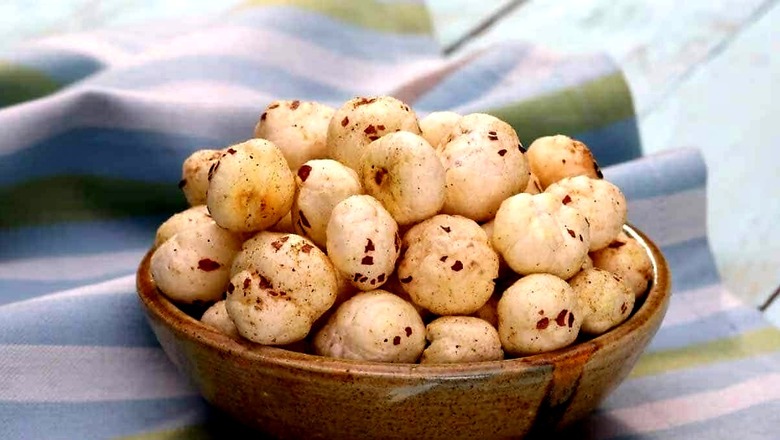
views
Snacking is a popular way to satisfy cravings, but many overlook the potential drawbacks of choosing snacks with minimal nutritional value. However, the famous Indian snack makhana is revolutionising the world of snacks. Also known as fox nut, lotus seed or plant pop, makhana is a highly nutritious option that is gaining global recognition. It is sourced from the water lily plant and is increasingly touted as a superfood for its remarkable health benefits.
These versatile seeds are enjoyed not only as a crunchy snack but also used in various dishes like the traditional milk pudding kheer and can be ground into flour. Rich in vitamin B, protein and fiber, this tiny seed is cultivated in Bihar which produces 90% of the world’s makhana, according to the BBC.
Cultivating makhana presents its own set of challenges for farmers. The water lily plant, which produces these seeds, has large and circular leaves that float on the pond’s surface. Farmers traditionally had to dive into muddy ponds upto 8 feet deep, enduring discomfort as mud and debris entered their ears, eyes, nose and mouth. This often led to skin problems and the thorn-covered plants would cause cuts all over the body.
Recently, there have been significant improvements in the cultivation methods. Farmers have shifted to growing makhana in shallow fields which has simplified the harvesting procedure.
Dr Manoj Kumar, a key figure in this transformation, recognised a decade ago that expanding cultivation in deep ponds would be challenging. Now Senior Scientist at the National Research Centre for Makhana (NRCM), Dr Kumar played a crucial role in developing methods for cultivating water lilies in shallow fields. “With our innovations, growing fox nuts is now as easy as any crop grown on land. The only amount of water needed is a foot. The workers don’t have to work for hours in deep water,” Dr Kumar told BBC.
Through extensive experimentation with different seed varieties, Dr Kumar’s center discovered a more resilient and productive type of variety. This new variety has significantly boosted farmers’ earnings, reportedly tripling their income.
According to the news outlet, by 2022, the area used for makhana farming had expanded to 35,224 hectares (87,000 acres), nearly threefold increase over the past 10 years. Traditionally, after harvesting makhanas, they undergo a process of washing and roasting. Following this, they are struck with a mallet-like tool to make them pop.
Makhana has become immensely popular in the global market, thanks in part to the efforts of Nadine Habayeb and Priyal Bhartia. Their brand, Bohana, introduced the air-popped water lily seeds to the US market. Co-Founder and COO Priyal revisited her Indian roots and rediscovered her childhood favourite snack – makhana. She introduced this snack to Co-Founder and CEO Nadine who became a fan. Committed to sharing this super snack with the world, the duo launched Bohana.
Their breakthrough came in 2020 when Nadine appeared on ABC’s business reality show, Shark Tank, earning two offers from the investors and receiving acclaim for Bohana’s innovative approach to snacking.




















Comments
0 comment